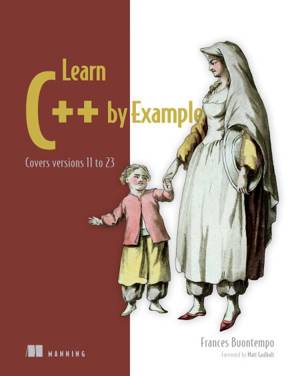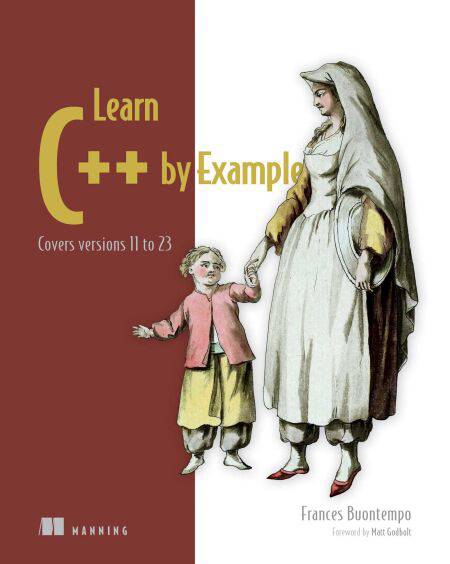
- Retrait gratuit dans votre magasin Club
- 7.000.000 titres dans notre catalogue
- Payer en toute sécurité
- Toujours un magasin près de chez vous
- Retrait gratuit dans votre magasin Club
- 7.000.0000 titres dans notre catalogue
- Payer en toute sécurité
- Toujours un magasin près de chez vous
49,20 €
+ 49 points
Format
Description
Learn the latest features of modern C++ by coding eight engaging projects.
Don’t let the multitude of C++ updates intimidate you! Learn C++ by Example takes you through the major language changes since C++ 11, with each new feature demonstrated with a fun project or minigame. It’s perfect for beginners who know C++ basics, coders coming back to the language, or current C++ developers missing out on everything the language has to offer.
Inside Learn C++ by Example you’ll find important skills such as:
Utilizing the new C++ features from C++ 11 to 23 Effectively testing your C++ code What happens “under the hood” of C++ code Picking efficient algorithms and data structures std::format, STL algorithms, ranges, and coroutines
Learn C++ by Example rapidly gets up to speed with C++’s updates and changes, and ensures you’ll stay ahead as the language continues to change and grow. You’ll learn about vectors and ranges by generating Pascal’s triangle, create a racing game with new special member functions, build a slot machine with parameter packs, and more.
Foreword by Matt Godbolt.
About the technology
C++ delivers the flexibility and performance you need for everything from low-level systems programming to secure financial applications and AAA game development. First introduced in 1985, the language is still evolving, with exciting changes in every new version. Whether you’re just getting started or you’re a veteran coder adding to your toolbox, the eight hands-on projects in this book will get you up to speed on modern C++ features and practices.
About the book
Learn C++ by Example is a fun and practical way to start writing modern C++ code. It guides you through entertaining challenges, emphasizing features and techniques made possible by C++ 17, 20, and 23. You’ll learn about objects and arrays by creating a deck of playing cards, master the C++ random library for a number guess game, use the chrono library to create a countdown timer, and much more. Along the way you’ll also pick up valuable tips for testing, project organization, and other productivity skills.
What's inside
New C++ features from C++ 11 to 23 Effectively test your C++ code What happens “under the hood” Efficient algorithms and data structures
About the reader
Requires beginner to intermediate C++ skills.
About the author
Frances Buontempo is an experienced C++ developer and the editor of ACCU’s Overload magazine.
The technical editor on this book was Timothy Jaap van Deurzen.
Table of Contents
1 Hello again, C++!
2 Containers, iterators, and ranges
3 Input of strings and numbers
4 Time points, duration, and literals
5 Creating and using objects and arrays
6 Smart pointers and polymorphism
7 Associative containers and files
8 Unordered maps and coroutines
9 Parameter packs and std::visit
Don’t let the multitude of C++ updates intimidate you! Learn C++ by Example takes you through the major language changes since C++ 11, with each new feature demonstrated with a fun project or minigame. It’s perfect for beginners who know C++ basics, coders coming back to the language, or current C++ developers missing out on everything the language has to offer.
Inside Learn C++ by Example you’ll find important skills such as:
Utilizing the new C++ features from C++ 11 to 23 Effectively testing your C++ code What happens “under the hood” of C++ code Picking efficient algorithms and data structures std::format, STL algorithms, ranges, and coroutines
Learn C++ by Example rapidly gets up to speed with C++’s updates and changes, and ensures you’ll stay ahead as the language continues to change and grow. You’ll learn about vectors and ranges by generating Pascal’s triangle, create a racing game with new special member functions, build a slot machine with parameter packs, and more.
Foreword by Matt Godbolt.
About the technology
C++ delivers the flexibility and performance you need for everything from low-level systems programming to secure financial applications and AAA game development. First introduced in 1985, the language is still evolving, with exciting changes in every new version. Whether you’re just getting started or you’re a veteran coder adding to your toolbox, the eight hands-on projects in this book will get you up to speed on modern C++ features and practices.
About the book
Learn C++ by Example is a fun and practical way to start writing modern C++ code. It guides you through entertaining challenges, emphasizing features and techniques made possible by C++ 17, 20, and 23. You’ll learn about objects and arrays by creating a deck of playing cards, master the C++ random library for a number guess game, use the chrono library to create a countdown timer, and much more. Along the way you’ll also pick up valuable tips for testing, project organization, and other productivity skills.
What's inside
New C++ features from C++ 11 to 23 Effectively test your C++ code What happens “under the hood” Efficient algorithms and data structures
About the reader
Requires beginner to intermediate C++ skills.
About the author
Frances Buontempo is an experienced C++ developer and the editor of ACCU’s Overload magazine.
The technical editor on this book was Timothy Jaap van Deurzen.
Table of Contents
1 Hello again, C++!
2 Containers, iterators, and ranges
3 Input of strings and numbers
4 Time points, duration, and literals
5 Creating and using objects and arrays
6 Smart pointers and polymorphism
7 Associative containers and files
8 Unordered maps and coroutines
9 Parameter packs and std::visit
Spécifications
Parties prenantes
- Auteur(s) :
- Editeur:
Contenu
- Nombre de pages :
- 248
- Langue:
- Anglais
Caractéristiques
- EAN:
- 9781638354710
- Date de parution :
- 01-04-24
- Format:
- Ebook
- Protection digitale:
- Adobe DRM
- Format numérique:
- ePub

Les avis
Nous publions uniquement les avis qui respectent les conditions requises. Consultez nos conditions pour les avis.






